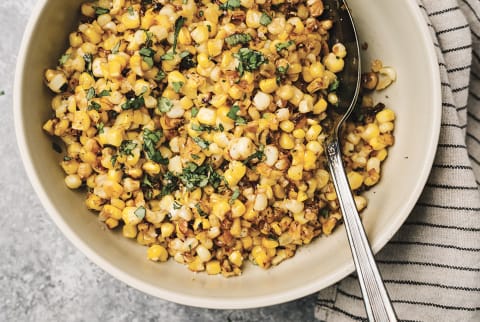Advertisement
Going Gluten-Free? Why This Celebrity Nutrition Expert Wants You To Ditch Corn


In The Virgin Diet and my Sugar Impact Diet book, I often talk about gluten. This protein—found in grains, mainly wheat, rye, and barley—is on my list of the top high-FI (food intolerance) foods that can put your immune system on high alert and even set off a domino effect of unwanted chemical changes in your body.
These changes can also lead to digestive issues, headaches, trouble sleeping at night, joint and muscle pain, and even shifts in your mood and mental health. Even if you don't have celiac disease (which only a small percentage of Americans do), there's a good chance you might be one of the 18 million people that have gluten sensitivity, which makes getting rid of gluten a helpful choice.
That said, in my experience, gluten is just one of seven high-FI foods that may be affecting your well-being. Another one I often recommend nixing? Corn.
The case for ditching corn.
Here's the scoop: While corn doesn't contain any gluten, what it does contain is a type of protein called zein that triggers an abnormal immune response similar to gluten. (So similar, in fact, that you will often hear zein referred to as "corn gluten.")
In one study published in the journal Nutrients1, that response was linked to an increase in gastrointestinal inflammation in patients diagnosed with celiac disease, which could potentially worsen their GI symptoms. While research is more limited, in my experience, zein may be just as bad for people with gluten sensitivity.
Why does inflammation matter? While there's the good kind (called acute inflammation) that immediately goes into action when you're hurt or injured, there's also the bad kind (called chronic inflammation) that's connected to a number of health concerns. And while a lot of things can contribute to chronic inflammation—poor sleep, everyday stress, not getting the right kind of exercise—the biggest offender is often diet, which is why cutting out irritants like gluten and corn can be so important.
A few more reasons to keep corn off the menu.
In case you need further convincing, here are three more reasons I suggest going corn-free:
- As much as 92% of all U.S. corn is genetically modified. Not only are GMOs damaging to the friendly bacteria in our gut, but GMO crops require the use of even more pesticides, which eventually make their way into our air, soil, and water.
- Several types of fungi grow on corn. Some of those fungi produce toxic compounds called mycotoxins, which have been linked2 to both short-term and long-term health effects in humans, including immune deficiency and certain types of cancer.
- It's a high-glycemic food (sometimes called a "fast carb"), which can cause your blood sugar levels to spike.
The takeaway.
I generally advise against eating high-FI foods like gluten and corn because they may trigger inflammation—particularly for people with celiac disease, as well as anyone with a gluten sensitivity. This can lead to impacts on overall well-being. For one of my favorite ways to manage inflammation, check out my go-to smoothie recipe.

Why Nutrition Is Key To Changing Your Relationship With Alcohol
Brooke Scheller, DCN, CNS

Why Alcohol Sabotages Your Gut Health & How To Get Back On Track
Brooke Scheller, DCN, CNS

Why Nutrition Is Key To Changing Your Relationship With Alcohol
Brooke Scheller, DCN, CNS

Why Alcohol Sabotages Your Gut Health & How To Get Back On Track
Brooke Scheller, DCN, CNS

Why Nutrition Is Key To Changing Your Relationship With Alcohol
Brooke Scheller, DCN, CNS

Why Alcohol Sabotages Your Gut Health & How To Get Back On Track
Brooke Scheller, DCN, CNS

Why Nutrition Is Key To Changing Your Relationship With Alcohol
Brooke Scheller, DCN, CNS

Why Alcohol Sabotages Your Gut Health & How To Get Back On Track
Brooke Scheller, DCN, CNS














